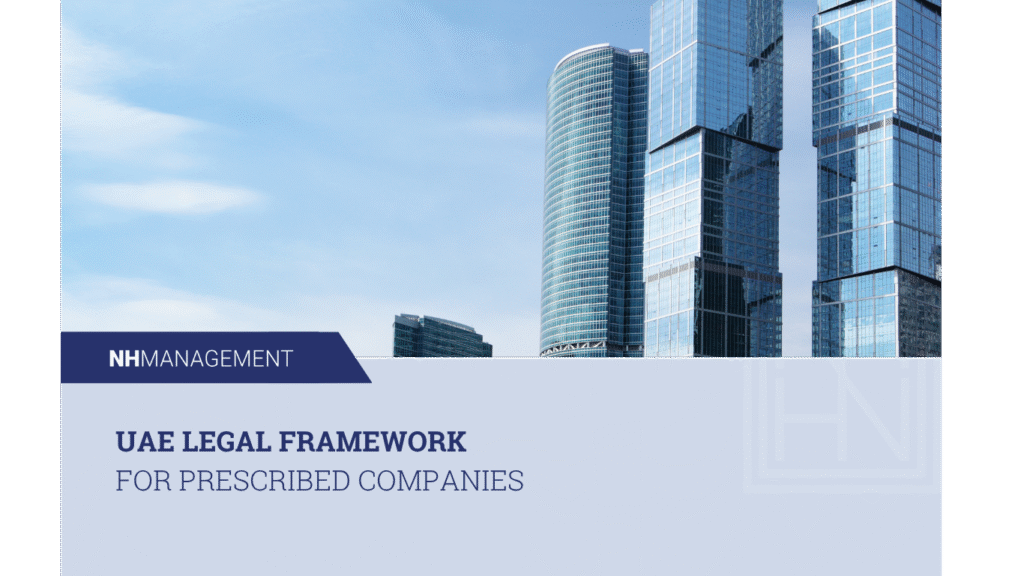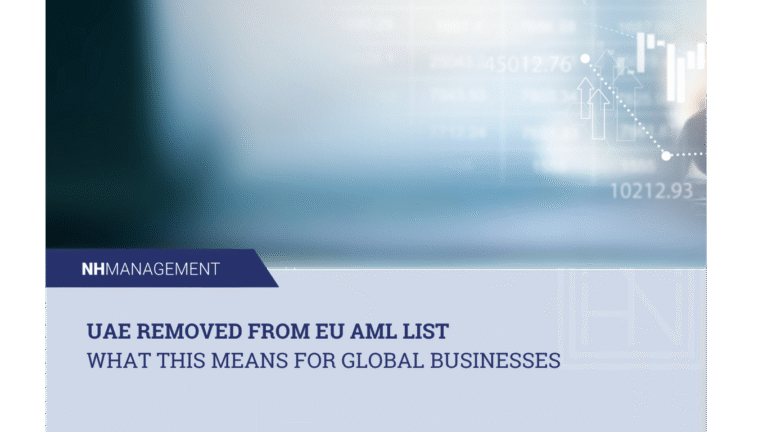Understanding the Legal Framework for Prescribed Companies in the UAE

Understanding the Legal Framework for Prescribed Companies in the UAE
Navigating the legal framework for prescribed companies in the UAE can be complex without the right guidance. At NH Management, we specialize in simplifying these regulatory structures—helping investors, family offices, and business owners establish compliant and efficient entities under the Dubai International Financial Centre (DIFC) and other UAE jurisdictions.
This guide provides a comprehensive overview of the legal and regulatory environment governing prescribed companies, ensuring you understand your obligations and opportunities for business growth.
Introduction to Prescribed Companies in DIFC
The DIFC introduced the Prescribed Company Regulations in 2019, replacing the former Special Purpose Company (SPC) and Intermediate Special Purpose Vehicle (ISPV) regimes. These regulations were designed to offer a flexible, efficient, and cost-effective corporate structure suitable for asset holding, investment management, and wealth protection. To understand how prescribed companies compare to other UAE business vehicles, explore our Understanding UAE Business Structures guide.
A prescribed company is a private company limited by shares, classified as a Small Private Company under the DIFC Companies Law. These entities benefit from exemptions from some typical corporate requirements, such as filing full audited financials with the DIFC Registrar of Companies, allowing them to focus on their investment or holding activities.
Key Regulations Governing Prescribed Companies
The legal framework for prescribed companies in the UAE includes several critical regulations aimed at maintaining transparency, governance, and economic integrity:
1. Federal Law No. 2 of 2015 on Commercial Companies
This federal law outlines the general principles applicable to all companies incorporated in the UAE. It governs incorporation procedures, share capital structures, and corporate governance obligations that also apply to prescribed companies in certain contexts.
2. DIFC Prescribed Company Regulations 2019
These regulations specifically define the eligibility criteria, permitted activities, and compliance obligations of prescribed companies within the DIFC. They ensure that prescribed entities meet the Centre’s high governance and anti-money laundering standards.
3. Economic Substance Regulations (ESR)
Prescribed companies carrying out “relevant activities” must demonstrate sufficient economic substance within the UAE. This includes maintaining adequate staff, physical presence, and income-generating operations to comply with Cabinet Resolution No. 57 of 2020.
4. Ultimate Beneficial Ownership (UBO) Disclosure
Under Cabinet Resolution No. 58 of 2020, all UAE entities, including prescribed companies, must identify and maintain a register of their ultimate beneficial owners. This enhances transparency and supports the country’s AML/CFT framework.
5. Free Zone Authority Rules
Prescribed companies located within free zones such as DIFC must adhere to specific free zone regulations that govern licensing, permitted activities, and ongoing reporting obligations.
Compliance Requirements for Prescribed Companies
Maintaining compliance within the legal framework for prescribed companies in the UAE is critical to avoid penalties and protect corporate standing. Core compliance obligations include:
Annual Filings: Submission of annual returns and, if applicable, audited financial statements.
UBO and ESR Reporting: Maintaining updated registers and filing required notifications with authorities.
Registered Office and CSP Appointment: Each prescribed company must have a registered address in DIFC and, in many cases, appoint a Corporate Service Provider (CSP) such as NH Management.
Activity Approvals: Some activities may require prior approval from the DIFC Registrar or other UAE regulators.
At NH Management, we ensure clients remain fully compliant by managing filings, renewals, and ongoing reporting requirements seamlessly.
Benefits of the DIFC Legal Framework
The legal framework for prescribed companies in the UAE provides several strategic advantages that make it one of the most attractive structures for global investors:
Tax Efficiency: DIFC offers a zero-percent tax regime on qualifying income, alongside full foreign ownership rights.
Enhanced Privacy: Simplified reporting and exemption from public disclosure obligations provide confidentiality for shareholders.
Global Recognition: DIFC’s English common law system offers internationally recognized legal protections.
Investment Flexibility: Prescribed companies can hold a variety of assets, including real estate, shares, and intellectual property, both locally and globally.
Partner with NH Management
Understanding and navigating the legal framework for prescribed companies in the UAE requires expert knowledge and hands-on support. At NH Management, we assist clients in establishing, structuring, and administering prescribed companies that comply fully with DIFC and federal requirements.
Our team provides comprehensive solutions covering incorporation, compliance monitoring, and governance advisory—allowing you to focus on long-term asset growth and protection.
For authoritative, transparent guidance on prescribed companies and other UAE structures, visit DIFC’s official regulations page.
Contact us today at in**@**********nt.com or call +971 4 222 1327 to schedule a consultation.







